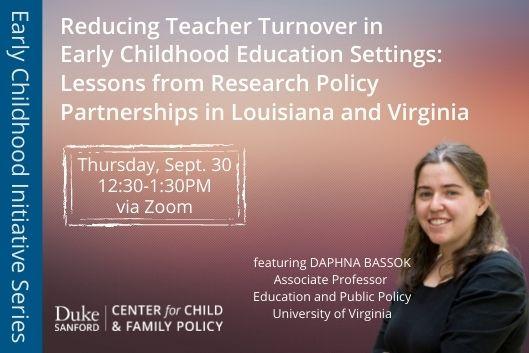Reducing Teacher Turnover in Early Childhood Education Settings: Lessons from Research Policy Partnerships in Louisiana and Virginia

Speaker
Daphna Bassok
The early childhood education (ECE) workforce in the United States is characterized by low wages, limited benefits, high levels of stress, and high rates of turnover. These work conditions have negative implications for young children during a critical moment in their development. It is often posited that addressing the low wages of early educators, particularly in the childcare sector, is an essential part of any effort to professionalize and stabilize this workforce and to improve quality in ECE settings. To date, however, there has been no rigorous evidence on the impacts of compensation reforms (e.g. increased wages, financial bonuses) in early childhood settings. This talk shares findings from the first experiment to-date on the effects of financial incentives on teacher retention in early childhood. In 2019, we partnered on a set of experiments with the Virginia Department of Education, which invested $3.8 million in a financial incentive program designed to improve retention among early educators. Our main study asked: to what extent does a $1,500 financial incentive lead to reductions in teacher turnover? We find that a $1,500 financial incentive led to a substantial drop in turnover among childcare teachers, cutting turnover in half. Implications, especially in light of the COVID's impact on the childcare workforce, will be discussed.
Daphna Bassok is an associate professor of education and public policy at the University of Virginia and is the associate director of EdPolicyWorks, a joint collaboration between the School of Education and Human Development and the Frank Batten School of Leadership and Public Policy.
Currently, she is leading the multi-year evaluation of Virginia's Federal Preschool Development Grant Birth-5 initiative, which aims to expand access to stable, affordable, and quality early education for Virginia's families and children, particularly those who are most vulnerable. As part of that evaluation, her team is conducting the first randomized controlled trial measuring the impacts of financial supports for early educators on reducing turnover.
She holds a Ph.D. in the economics of education and master's degrees in economics and in policy analysis and evaluation, all from Stanford University.
The Early Childhood Initiative seeks to bring together scholars to address early childhood challenges and produce world-class scholarship that will help maximize the potential of all children during their early years.
Categories
Lecture/Talk, Research, Social Sciences, United States Focus
